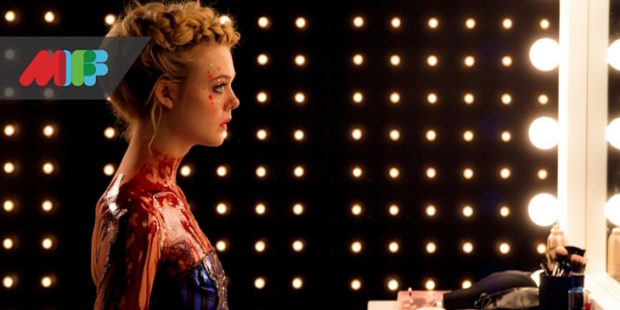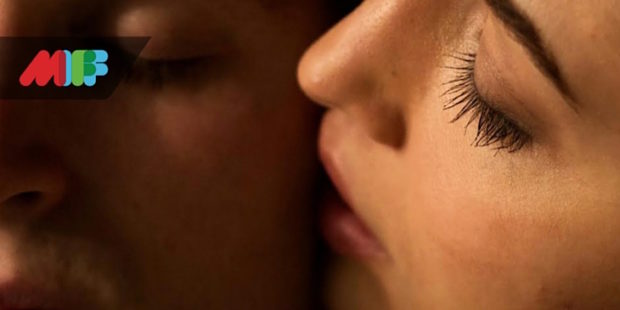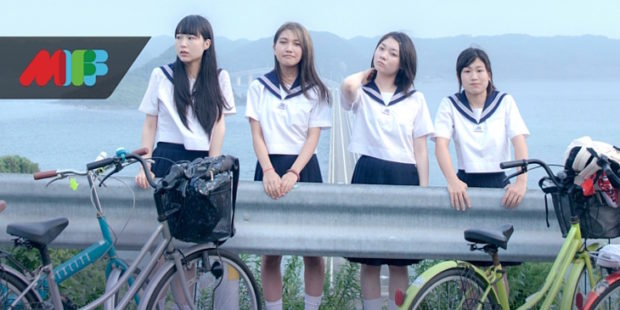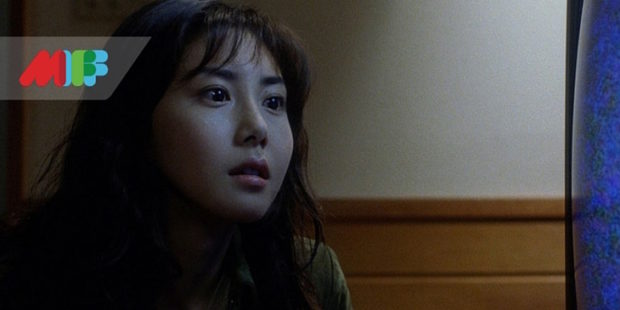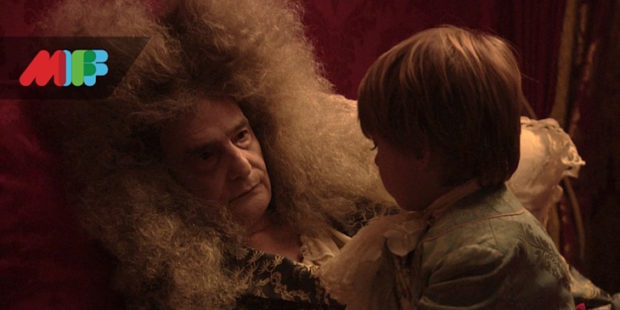 It had been a few years since the Sydney-based The Reel Bits last made a trip to Melbourne for MIFF. There was no malice aforethought in that, but happenstance and life making other plans had kept us at arm’s length from one of Australia’s longest-running film festivals. Yet the field was strong this year, living up to the promise of the programming slogan “Films That Stay With You.” In the case of some, they will stay no matter how hard we try and shake them.
It had been a few years since the Sydney-based The Reel Bits last made a trip to Melbourne for MIFF. There was no malice aforethought in that, but happenstance and life making other plans had kept us at arm’s length from one of Australia’s longest-running film festivals. Yet the field was strong this year, living up to the promise of the programming slogan “Films That Stay With You.” In the case of some, they will stay no matter how hard we try and shake them.
While our stay in Melbourne was all too brief, we managed to see around 40 films from the 2 week program, partially due to our previous coverage of Sydney Film Festival and Revelation Perth International Film Festival throughout June and July, along with some screeners kindly provided by MIFF for review purposes. The cinema experience is hard to beat though, especially when it involves the 5-hour Japanese film HAPPY HOUR or the insanely divisive THE NEON DEMON. The latter was a clear highlight of the festival, holding an equal top place in our hearts alongside LOVESONG. By sheer coincidence, both starred Jena Malone, but everyone curates their own screening list after all.
Melbourne is a city transformed thanks to the festival, and it’s impossible to go anywhere without at least feeling the festival. The Comedy Theatre’s rigid seats and epic queues in the rain may have faced the brunt of the social media roasts, but they were also some of the most communal cinematic moments as well. Which is the joy of cinema for us, hearing reactions to things you may not have picked up on, laughter during your sheer terror (or vice versa) or making single-serve friends in the more esoteric films screening up at Kino. Casually running into old acquaintances, catching snippets of conversations in queues, or downing the contents of a food van between sessions is par for the course, and it fills us with unspeakable joy.
Links to the full reviews have been provided where available, but check out our full coverage of the festival at our 2016 Melbourne International Film Festival portal.
★★★★★ – Certified Bitstastic
LOVESONG: A bittersweet love story that defies convention, focusing on the intimate moments between two strong female leads. With strong performances by Riley Keough and Jena Malone, it doesn’t always provide us with the expected happy endings that are expected of such narratives, but nevertheless serve as a testament to the notion of enduring love. Our pick for favourite of the festival. Full Review >>
THE NEON DEMON: It’s apparently Jena Malone’s festival, and we’re just living in it. The seedy underbelly of Los Angeles has never looked so divine, in what can only be described as Showgirls if it was conceived by David Lynch. “Beauty isn’t everything. It’s the only thing.” The words belong to the film’s seedy fashion designer, but they could just as easily be describing the film. THE NEON DEMON shows that there might be something more beneath the surface when it comes to beauty, but when it looks this gorgeous, it really is the only thing that counts. Full Review >>
★★★★½ – Super Highly Recommended
JOE CINQUE’S CONSOLATION: A focused examination of a troubling human tragedy, breathing new life into the departed by exploring the unknowable. Based on Helen Garner’s book and the real events that inspired it, it gives a voice to the voiceless and explores the complex minds of the players involved. Which is the greatest accomplishment of the film: rather than merely digging up a tragedy, it breathes new life into Joe Cinque himself. Full Review >>
AFTER THE STORM: The type of layered and beautiful character study we’ve come to expect from the master Hirokazu Kore-eda. Kore-eda’s Like Father, Like Son made a compelling case about the unavoidability of hereditary traits, and here he continues the nature versus nurture theme, repeatedly showing how one man’s failings as a father stem from his own attempts to escape from the cycle his late father left him. Full Review >>
CERTAIN WOMEN: Kelly Reichardt’s deliberate pace emphasises the strength of the characters in this measured study. Following vignettes of four women, Reichardt’s film simply lays out these stories in a row as lasered character studies. She once again leaves us with no conclusive answers to her character’s dilemmas, and like all things she does, allows us to come to our own conclusions at a distinct pace. Full Review >>
TICKLED: Truth is stranger than fiction in a head-shaking, hilarious and ridiculously tense doco about the world of competitive tickling that’s full of twists. Narrated by Farrier’s wry and comical attitude, a mixture of Louis Theroux’s bullshit detector and John Oliver’s outsider observations, TICKLED is nevertheless an often terrifying examination of cyber-bullying and intimidation. Full Review >>
FIRE AT SEA: An observational documentary about the refugee crisis on the Mediterranean island of Lampedusa, Gianfranco Rosi’s Golden Bear winning film contrasts tradition with the passage of the mostly Syrian refugees. Not using any narration or much on-screen text, it simply lets us watch the reality of the refugee tragedy. If you are running (or voting) in the upcoming Australian or US elections, FIRE AT SEA should be mandatory viewing.
WEINER: One of the most famous penises in politics is only part of the story in this fascinating fly-on-the-wall piece that is part redemption story, part confessional and part examination of the media machine. WEINER is a chronicle of what happens when a singular personality is forced to use his energy to defend lifestyle choices instead of the things he stands for politically. WEINER shows us that the future of public office is set, and a stark warning of what happens when emotion rules decisions just in time for the 2016 US presidential elections. Full Review >>
THE RED TURTLE: Direct from winning the Un Certain Regard Special Prize at Cannes, Studio Ghibli’s co-produced film is masterclass in visual storytelling. Without using any dialogue, it tells the story of a man who washes ashore on an isolated island, but his repeated attempts to escape are stymied by an unseen force. Oftentimes abstract and lyrical, the story unfolds in a gentle and dreamlike fashion, and director Michael Dudok de Wit has ensured that the Studio Ghibli legacy will continue outside of Japan and into a new generation of filmmakers. Full Review >>
THE HANDMAIDEN: Often over-the-top, but also gorgeously shot and erotic to the point of parody. In other words, it’s the latest masterpiece from Park Chan-wook. The adaptation of Sarah Waters’ Fingersmith takes a distinctly different turn in this Korean/Japanese period thriller, built around stunning visuals, captivating performances and one of the most menacing uses of an octopus since Oldboy. Full Review >>
KUBO AND THE TWO STRINGS: A stunningly realised production from the creators of Coraline, ParaNorman and The Boxtrolls. Drawing on an ancient Japanese aesthetic, it blends state of the art animation (that lighting!) with a top-notch voice cast. At its heart, the film is a coming-of-age film that obeys the first law of children’s cinema by killing the parents, but then spends the rest of the film exploring that familial relationship against the backdrop of a hero’s journey quest. An instant animated classic.
SUBURRA: A classy Italian thriller about politics and the mob, one that keeps escalating its drama at every turn. Co-funded by Netflix, with the intention of a follow-up series to commence in 2017, SUBURRA is a slick modern production. Everything is bathed in a purple neon underglow, giving even the most innocuous corners a sense of seediness. Even the gratuitous sex sequences are explicit, it’s in a Penthouse kind of way, a formal eroticism that gives way to chaos. It may not do much for the Italian tourism industry, but it does restore the heightened drama of the genre to its glory days, albeit with a contemporary twist. Full Review >>
★★★★ – Highly Recommended
PATERSON: Jim Jarmusch returns with a quiet and literally poetic portrait of a bus driver (Adam Driver) and his wife (Golshifteh Farahani) in New Jersey. Similar to the work Jarmusch produced between Permanent Vacation and Night on Earth, there is an unhurried minimalism to this film. PATERSON finds the poetry in the everyday, and it’s just a wonderful way to pass the time. Full Review >>
HAPPY HOUR: Running for well over five hours, and on that level is as experimental a festival film as you are likely to see. Yet the four award-winning leads, collectively given best actress at the 2015 Locarno International Film Festival, ensure that that time is spent exploring the most human of stories. What results from the gently epic journey is a rare beast, a delicate balance of heightened drama that still allows deep character exploration around a common theme of connections and conversations. Full Review >>
HIGH-RISE: Transplanting J.G. Ballard’s 1970s treatise on modernism, Ben Wheatley’s adaptation is as beautiful as it is terrifying. Hiddleston comes into the film as a detached creature already, his stiff upper-lip Britishness contrasting with his bemused observations of the rich. As global politics increasingly divide rich and poor, and these structures are now commonplace, Ballard’s tale has even more weight than it did forty years ago. Full Review >>
NUTS!: Truth is stranger than fiction in this forgotten slice of American history. Or is it the other way around? Using a combination of roughly hewn animation and talking heads, Lane explores the singular personality of Dr. John R. Brinkley, purveyor of impotence cures and radio pioneer in the first half of the 20th century. It’s an unassuming film, almost playing like a PBS made-for-TV doco, one that downplays its own insanity. Yet when the other shoe falls, it’s like a good con: we know we’ve been suckered, but the purveyor has already got us in hook, line and sinker. Full Review >>
★★★½ to ★★★¾ – Better Than Average Bear
GIRL ASLEEP: Delving into territory dominated by Wes Anderson and Spike Jonze, director Rosemary Myers brings a touch of magical realism to Australian sensibilities, blending theatre and film effortlessly. Built around a coming-of-age story for socially awkward Greta Driscoll (Bethany Whitmore). GIRL ASLEEP is ultimately an empowering film for young women, with a positive message about self-image and refuting male entitlement. Full Review >>
GIMME DANGER: Jim Jarmusch’s second film in the festival is a chronicle of Iggy Pop and the Stooges, beginning with their downfall in 1973 and going back to see how the band came together, fell apart and went on to influence rock and roll for the following forty years. Told through interviews with Iggy Pop, Ron Asheton, Scott Asheton, James Williamson, Steve Mackay, Mike Watt and more, archival and stock footage, it’s a very different document to other rock profiles. Essential for Stooges fans, although others may have to do some rock homework in advance.
WHAT’S IN THE DARKNESS: Following the discovery of a body by the lake, Jing (Su Xiaotong) herself is drawn into her detective father Qu Zhicheng’s (Guo Xiao) investigations. The moment is a lightning rod of awakening for Jing, signalling her transition out of childhood as she experiences both a sexual and emotional metamorphosis, mirroring writer-director Wang Yichun’s memories of her childhood. A coming-of-age story set against the backdrop of a murder mystery is both intimate and chilling. Full Review >>
NOTES ON BLINDNESS: Like an incredibly sober version of Drunk History, this unique docu-drama from UK filmmakers Peter Middleton and James Spinney has actors actors Dan Skinner and Simone Kirby to lip sync to actual audio recordings theologian John Hull, as he gradually went blind in the early 1980s. It’s an amazing insight into the world of blindness, told in a deeply philosophical (albeit occasionally academic due to the nature of its subject) manner.
SONITA: Sonita Alizadeh, the titular subject in Rokhsareh Ghaemmaghami’s award-winning documentary, is not only fascinating but inspirational. An Afghani refigee living in Iran, she not only dreams of becoming a professional rapper, but genuinely believes her music can change the rigid religious attitudes of her part of the world. As a documentary, there are some questionable moments of intervention (or a lack thereof in other parts) from the filmmakers, and this raises some concerns about the objectivity. Yet the story is a good one, regardless of Ghaemmaghami’s personal involvement. If Sonita can overcome an entire system aimed at repressing her right of expression, what’s stopping you from getting out of bed today?
THARLO: Director Pema Tseden (Old Dog) follows sheep herder Tharlo as he has to journey into town to get an identity card, experiencing his first female relationship and big city adventures (like getting a haircut). The incredible stillness of the film is at a stark contrast with the monumental changes these simple acts bring a simple man. A slow-burning character study of a man who very quickly loses his sense of self and memories of his own identity. Plus, the photography is beautiful, and will no doubt many a voyage of self-discovery to Tibet.
CHEVALIER: A fun bit of absurdism from the director of Attenburg, one that waves a pointy finger at male pissing contests. In the incredibly simple yet layered premise, a group of six men on a fishing trip compete to see who is ‘the best’ at everything, based on a series of arbitrary tests that cover everything from singing to literally measuring erect penises. Full Review >>
OUR HUFF AND PUFF JOURNEY: It’s not about the destination in this Japanese road movie, even if that destination is a boy band. In a film, couldn’t be stylistically further from Daigo Matsui’s over-the-top 2012 debut, Afro Tanaka, four female high school students on the cusp of adulthood decide to make the trip from Fukuoka to Tokyo to see CreepHyp. The film works at its best when it is a character-driven study of obsession, social media, self-image and the divisiveness it causes. Full Review >>
BEING 17: The premise of André Téchiné’s French drama had the potential of being too on the nose. A seventeen-year-old student (Kacey Mottet Klein) who lives with his mother (Sandrine Kiberlain), the local doctor, is forced to also live with his bully (Corentin Fila) to aid the latter’s studies. Playing out over a series of “trimesters,” the boys explore their emotions and their sexuality through fighting, showing their fear and gentler emotions in the heightened confusion of youth. Shot against beautifully misty mountains, this familiar tale is elevated by the strength of the central performances.
THE LOVE WITCH: A lovingly recreated tribute to the soft horror-porn of the 1960s and 1970s, Viva filmmaker Anna Biller faithfully replicates the heightened look and feel of the era with lush 35mm “Technicolor.” Yet Biller doesn’t stop there, following her modern day witch Elaine (The 3 Minute Update‘s Samantha Robinson) through a series of scenarios that stepped right out of period schlock horror. While not a parody in the style of Machete, there’s always the danger that these kind of films will cross over into being just plain bad, but despite the hefty running time, Biller’s latest is a joy for cult cinema fans.
★★★ – Worth A Look
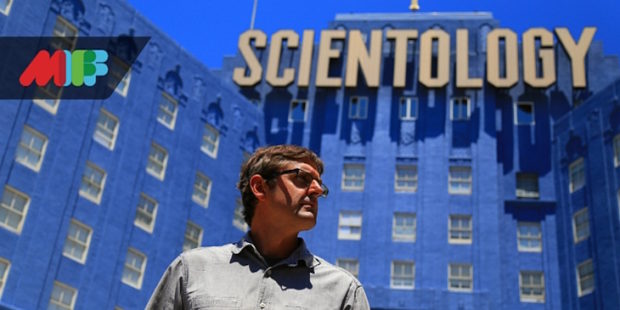
LOUIS THEROUX: MY SCIENTOLOGY MOVIE: Alex Gibney’s Going Clear might be the final word on the seemingly impenetrable Church of Scientology, but Louis Theroux finds a new angle to skewer this outwardly imposing institution with. Unable to gain access to the church itself, Theroux hires actors and former church members to reenact some of the more outlandish moments in the life of church leader David Miscavige. It doesn’t have the insight of Going Clear, but in Theroux’s typical fashion, he inadvertently reveals the grip the group has on current and existing members, and the methods by which they do it. Of course, it’s hilarious watching him do it as well.
THE LURE: The box says “vampire mermaid musical,” and that’s precisely what you get with this ’80s Polish throwback. Two siren mermaids, Silver (Marta Mazurek) and Gold (Michalina Olszanska), emerge off the coast of Warsaw, and are lured into civilisation by the bass playing of a local nightclub band. The convoluted mash of motifs might just be a boob delivery system, with the back half of the film making no literal sense or following a traditional structure. One thing is for sure: there is nothing else on this planet quite like THE LURE. Full Review >>
EMO THE MUSICAL: Australia’s darker answer to High School Musical, there’s a very mid-1990s sensibility to the musical styles and outfits of this firmly tongue-in-cheek outing. Based on the short film of the same name, Neil Triffett successfully transitions the concept into feature film. Poking equal amounts of fun at conservative Christian rock and emo culture, highlights include the numbers “It’s Alright to Give Up” and the apt “Was Jesus An Emo?” With a few touches of absurdism, including the home shock therapy kit for the closeted character and a bully who accepts major credit cards, this is definitely a film for folks who grew up on ABC’s Recovery.
AQUARIUS: The winner of the Official Competition at the Festival this year, it’s about a retired music critic played by Sonia Braga who resists the development of her apartment block by being the last holdout against the developers. A quiet character-based exploration of changes in a beachside area of Brazil, it’s a strong showcase for the nuanced Braga. Full Review >>
APPRENTICE: Fun fact! Much of this Singaporean film was written in Surry Hills Library in Sydney. Taking 5 years to make, and being a co-production between as many countries (Singapore, Germany, France, Hong Kong, Qatar), the examination of the capital punishment system in Singapore, concentrating on the impact it has on families through Aiman, a 28-year-old prison guard whose father was hanged, but is asked to step up as the apprentice to the chief executioner in a Singaporean prison. A focused character study.
★★½ – Wait For the DVD/Blu-ray
FEAR ITSELF: What are you afraid of? A visual essay examining attempting to answer this question also works as a potted history of horror cinema, but asks the audience to place themselves in the frame. made up entirely of clips from various horror and thriller films, with a slow burning narration layered over the top, the abstract approach ultimately robs the clips shown of any impact. If this is the point, to demonstrate that fear out of context are simply words and pictures on screen, then it still leaves us with the question we came in on. Full Review >>
KIKI: The thematic sequel to Jennie Livingston’s seminal 1990 documentary, Paris Is Burning. The modern Kiki scene is a subset of that original ballroom, yet we can see how it has evolved over time as well. Jumping around from interview to interview, the viewer neither gets a sense of what the current culture is all about, nor is there line-through for any of the people featured. KIKI is a snapshot in time, but fails to achieve the legendary status of legacy it follows. Full Review >>
LIFE AFTER LIFE: This winner of the Hong Kong International Film Festival Firebird Award misses the tonal mark in an unconventional ghost story. Leilei (Zhang Li) is possessed by the spirit of his deceased mother, and matter of factly tells his father Mingchun (Zhang Mingjun) that she has returned to transplant a tree that she planted when she was younger. In one scene, the duo try to load the uprooted tree onto the back of their truck. Copying a method they’ve seen of a group aimlessly moving a rock, they slowly twist and turn the tree up a plank, but just as they are about to reach the top, the tree falls off and forces them to start again. It might be speaking to the cycle of death and rebirth, but it’s a perfect way of describing the viewing experience of LIFE AFTER LIFE. Full Review >>
PERSONAL SHOPPER: There’s a lot to unpack in PERSONAL SHOPPER. Too much in fact. Indeed, the winner of the Best Director award at this year’s Cannes International Film Festival is difficult to even categorise. At times a tense thriller, but this ghost story has too many ideas going on at once to be effective. Full Review >>
THE MAGIC BRUSH: China’s animated fantasy film, also known as The Magical Brush (神笔马良), is based on Chinese folklore. Previously the subject of several stop-motion shorts in 1954 and 1955, it has been adapted numerous times in literature and film. Based on the premise that a young boy is given a brush that is able to create whatever he dreams up, Frankie Chung’s film (which apparently had some assistance from Disney’s animation mentors) doesn’t lack imagination. Yet it stumbles in basic storytelling, never gaining any kind of narrative flow
★★ – Rental or Streaming For Sure
ARTIST OF FASTING: Grotesque, challenging and disturbing, the Japanese spin on Kafka marks the return of a unique voice in Masao Adachi’s film. It would be unfair to treat the film as a wholly isolated entity. It is a statement piece, and like all provocative art it is meant to challenge. Audiences of Adachi’s film will undoubtedly feel the same way: if they find their own politics represented, there will be little cause for complaint. For the rest of us, challenging is the operative word here, and for a film that includes rape as a narrative tool, along with necrophilia and scatalogical references, the unflinching grotesquerie is just too much. Full Review >>
THE DEATH OF LOUIS XIV: The austere nature of Albert Serra’s film can be looked at in a number of ways, as we spend what feels like days inside the bedroom of the dying Sun King. On one hand, the repetitious and mundane series of events, as the King (Jean-Pierre Leaud) transitions from immortal king to a man dying of gangrene. On the other, this is as precisely as exciting as it sounds, and clever social satire of the 18th century aside, there are times you’d just wish the old bugger would hurry up and shuffle off sooner.
DOWN UNDER: A film that both reveals and revels in the ugly side of Australian culture, never sure of whether it’s a black comedy or just dark. Set around the Cronulla riots of 2005, Abe Forsythe’s film is not so much a discourse between the two sides as a simple dichotomy of stereotypes, and even the tips of the hat to solemn prayer do little to diffuse what is basically warring versions of the comments section of YouTube. The film’s tagline, “Australia v Australia: nobody wins,” preaches the idea that an “eye for an eye makes everyone blind.” It’s just unfortunate that it’s obfuscated behind the same provincialism that necessitates a national discussion around these issues in the first place. Full Review >>
CHILDHOOD OF A LEADER: Yet another polarizing film, Brady Corbet’s portrait of a bratty child might be gorgeously shot, but has all the enjoyment of watching a kid throw a tantrum in a supermarket. Set during the negotiations around the Treaty of Versailles in 1918 and 1919, the rise of power of the leader is told through three chapters chronicling three “tantrums” the boy throws. The severe jump at the end is literally disconcerting for viewers. It took all of our energy to not stand up and shout “Look at me, Damien! It’s all for you!” before leaping from the nearest window. Watch the first three Omen films instead.


